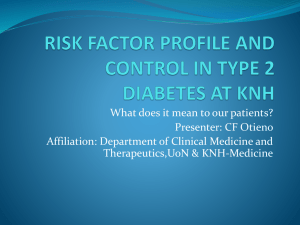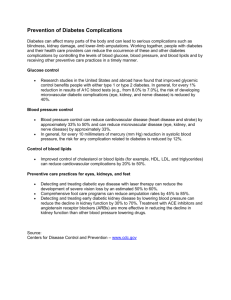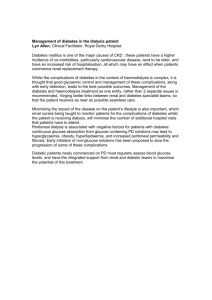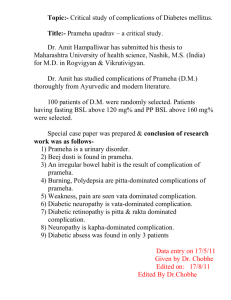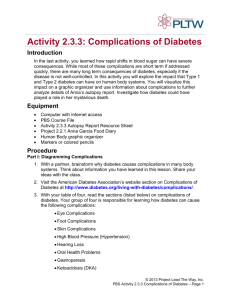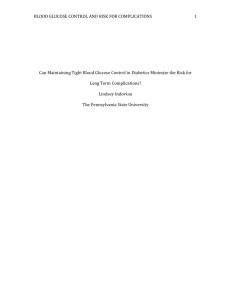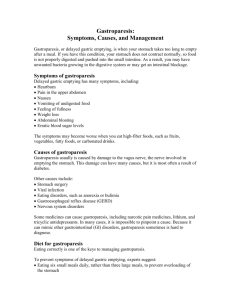Complications of Diabetes Quiz Understanding something is the first
advertisement
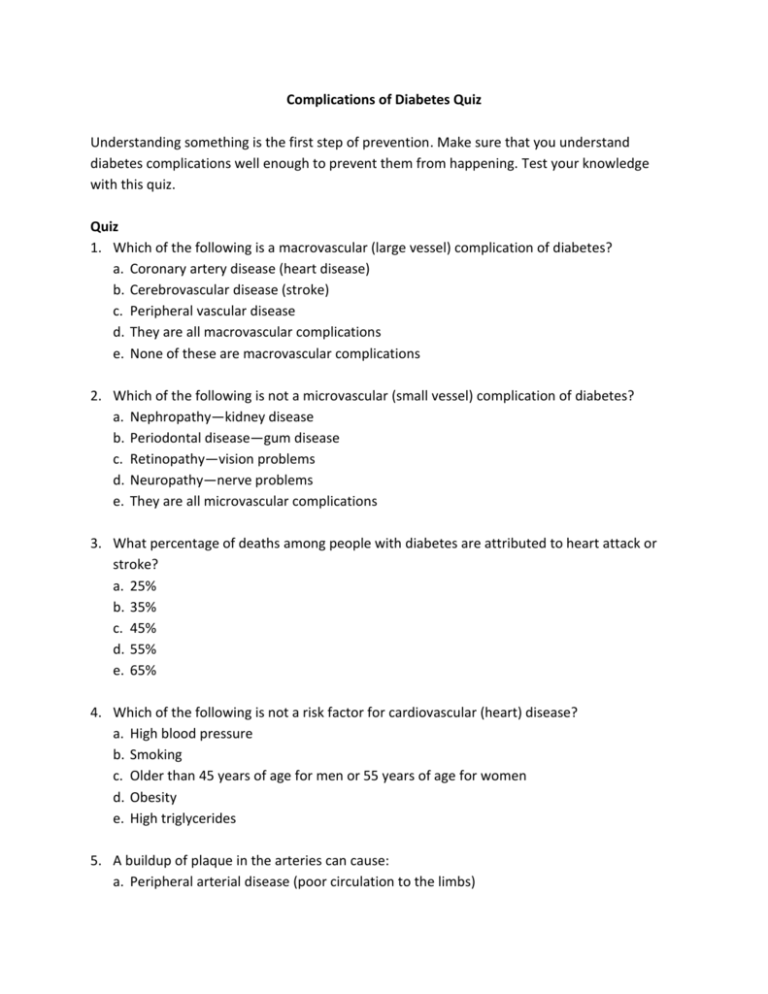
Complications of Diabetes Quiz Understanding something is the first step of prevention. Make sure that you understand diabetes complications well enough to prevent them from happening. Test your knowledge with this quiz. Quiz 1. Which of the following is a macrovascular (large vessel) complication of diabetes? a. Coronary artery disease (heart disease) b. Cerebrovascular disease (stroke) c. Peripheral vascular disease d. They are all macrovascular complications e. None of these are macrovascular complications 2. Which of the following is not a microvascular (small vessel) complication of diabetes? a. Nephropathy—kidney disease b. Periodontal disease—gum disease c. Retinopathy—vision problems d. Neuropathy—nerve problems e. They are all microvascular complications 3. What percentage of deaths among people with diabetes are attributed to heart attack or stroke? a. 25% b. 35% c. 45% d. 55% e. 65% 4. Which of the following is not a risk factor for cardiovascular (heart) disease? a. High blood pressure b. Smoking c. Older than 45 years of age for men or 55 years of age for women d. Obesity e. High triglycerides 5. A buildup of plaque in the arteries can cause: a. Peripheral arterial disease (poor circulation to the limbs) b. c. d. e. Stroke Angina (chest pain or pressure) Heart attack All of the above 6. Which of the following is not a risk factor for having an amputation? a. Going barefoot when outside b. Having high blood glucose levels for a long time c. Not doing regular foot examinations d. Having a family history of amputations e. All of the above are risk factors for having an amputation 7. Which of the following is not a symptom of gum disease? a. Bleeding gums b. Bad breath c. Loose teeth d. Pain when chewing e. Teeth appearing shorter as the gums grow 8. What is the most commonly occurring eye problem in people with diabetes? a. Retinopathy b. Glaucoma c. Macular degeneration d. Cataracts e. Dry eye 9. Which gastrointestinal condition is caused by impaired nerve function in people with diabetes? a. Constipation b. Gastroparesis (poor stomach motility) c. Irritable bowel syndrome d. Stomach ulcers e. Diverticulitis 10. Which of the following is not a complication of diabetes? a. Frozen shoulder b. Erectile dysfunction c. Gallbladder disease d. Osteoporosis e. Impaired wound healing Answers 1. d. They are all macrovascular complications. Macrovascular complications affect large blood vessels. 2. b. Periodontal disease—gum disease. Periodontal disease is not a microvascular complication of diabetes. Microvascular complications affect small blood vessels of the kidneys, eyes, and nerves. 3. e. 65%. Sixty-five percent of deaths among people with diabetes are attributed to heart attack or stroke. 4. c. Older than 45 years of age for men or 55 years of age for women. Age is a risk factor for development of cardiovascular disease, but the ranges are older than 55 years of age for men or 65 years of age for women. 5. e. All of the above. Each of the symptoms or conditions can result from a buildup of plaque in the arteries. 6. d. Having a family history of amputations. A family history of amputations does not increase your risk. 7. e. Teeth appearing shorter as the gums grow. Teeth often appear longer as the gums recede. 8. a. Retinopathy. Retinopathy is the most common eye problem among people with diabetes. 9. b. Gastroparesis. Gastroparesis is a condition in which the stomach takes too long to empty. It is caused by nerve damage. 10. c. Gallbladder disease. Gallbladder disease is not a complication of diabetes. Contributed by Elaine Hinzey, RD, LD/N Updated by Nutrition411.com staff Review date: 11/21/15
